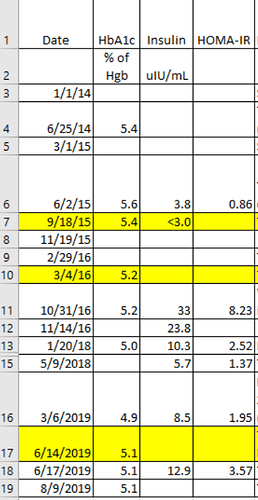That should work, if you’re fasting enough. The issue is whether that’s just a short term result (while fasting) or permanent (the results last once fasting is stopped). Here are my results (started LC on 1/1/14):
It’s unclear whether the lower values were because of more fasting, although in general, I’ve been fasting less and less. Peak was probably 2016-early 2019.
Also, I find that exercise, even working around the house, causes me to have higher glucose. That means my A1c would go up, but it has nothing to do with carbs or protein. (And during the time shown, I went from high fat to high protein, low fat, and my A1c went down…but I was also fasting.)
Finally, we could all have exactly the same blood glucose, and get multiple values of HbA1c, as one input to this is the length of time red blood cells are “alive”. The longer they live, the higher your HbA1c will be.



